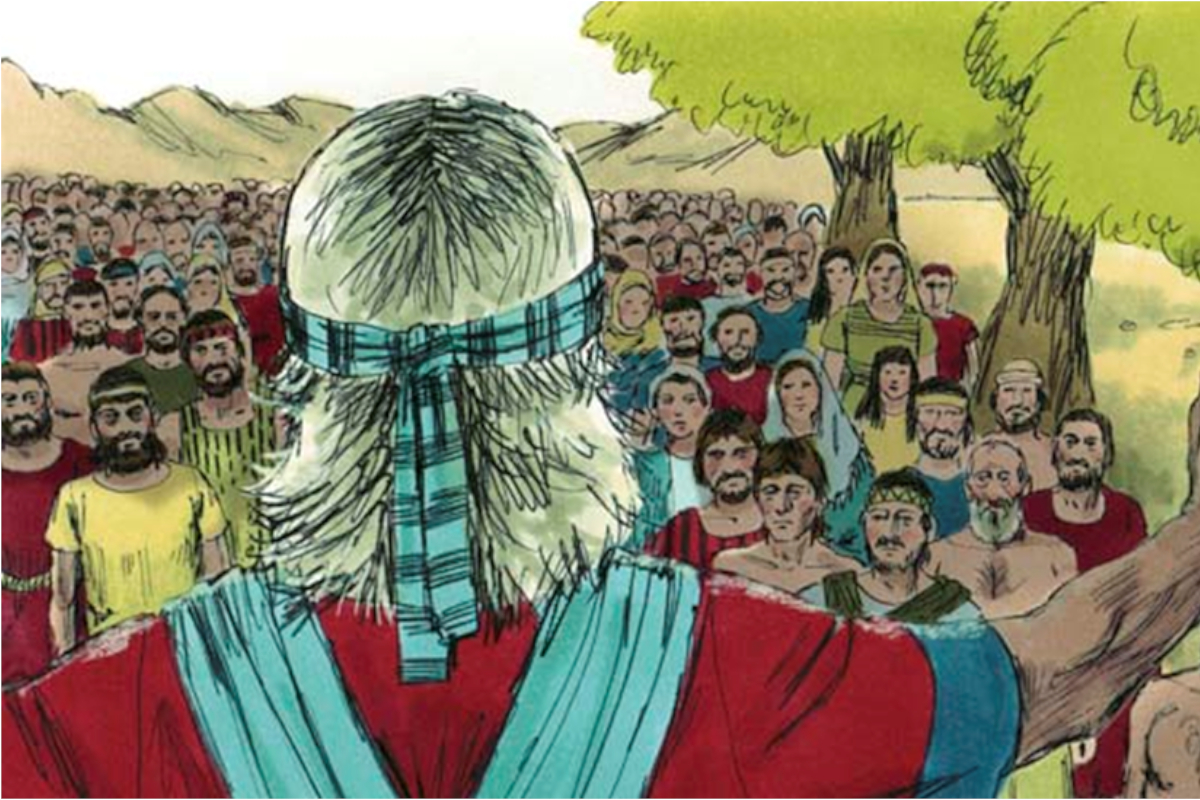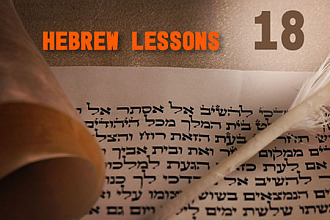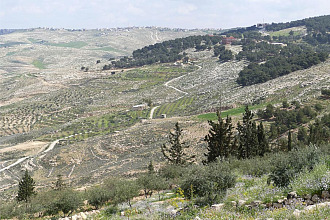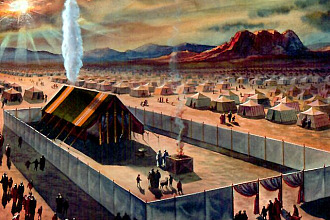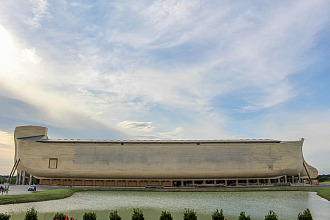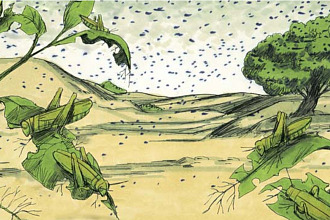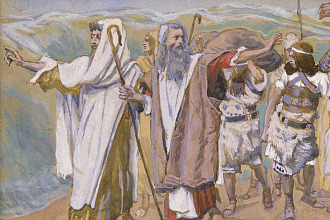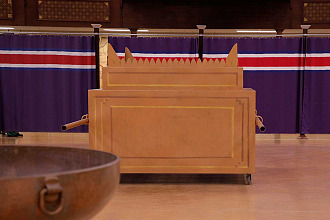Parasha for the Week: Devarim: Deuteronomy 1:1 – 3:22.
Haftarah: Isaiah 1:1 – 27.
Besorat Yeshua: Mark 6:28 - 40.
Overview
This Parsha begins the last of the Five Books of The Torah, sefer Devarim. This Book is also called Mishneh Torah, "Repetition of the Torah" (hence the Greek/English title Deuteronomy). Sefer Devarim relates what Moshe told Bnei Israel during the last five weeks of his life, as they prepared to cross the Jordan into Eretz Israel.
Moshe reviews the mitzvot, stressing the change of lifestyle they are about to undergo: from the supernatural existence of the desert under Moshe's guidance to the apparently natural life they will experience under Yehoshua's leadership in the Land.
The central theme this week is the sin of the spies, the meraglim.
The parasha opens with Moshe alluding to the sins of the previous generation who died in the desert. He describes what would have happened if they had not sinned by sending spies into Eretz Israel. Hashem would have given them without a fight all the land from the Mediterranean to the Euphrates, including the lands of Ammon, Moav and Edom.
He details the subtle sins, and reviews at length this incident and its results. The entire generation would die in the desert; Moshe would not enter Eretz Yisrael.
He reminds them that their immediate reaction to Hashem's decree was to want to "go up and fight" to redress the sin. He recounts how they would not listen when he told them not to go, that they no longer merited vanquishing their enemies miraculously. They ignored him and suffered a massive defeat. They were not allowed to fight with the kingdoms of Esav, Moav or Ammon these lands were not to be part of the map of Eretz Israel in the meantime. When the conquest of Canaan will begin with Sichon and Og, it will be via natural warfare.
"We Must Stand United"
Although this Parasha is about events that took place thousands of years ago, they are relevant today and especially during these days when we remember the destruction of the Temples. In the Parasha Moshe recalls the story of the spies. After scouting the land for 40 days, the spies returned with a negative report about Israel. The people were so affected, that they refused to enter the land. G-d punished them by decreeing that the generation pass away in the desert.
"Try Smiling at Others"
Moshe reminded us: "you complained in your tents, and you said, because the Almighty hated us He took us out of Egypt to hand us over to Amorites to destroy us." Is it possible that the Israelites thought that the Almighty hated them?
Rashi, elucidates this verse and gives us a profound insight into human nature. Says Rashi, that the Almighty really loved the Israelites, but because they felt hatred towards Him, they mistakenly felt that He hated them. As people say, "What you feel about someone else, you assume he feels about you." There is a strong tendency for people to project their own feelings towards others. If you constantly think that other people should not be trusted, it could show that you feel that others should not really trust you. If you always think that others disapprove of you, it indicates that you don't approve of others -- or perhaps yourself. To use this positively, if you feel love and compassion for others, you will assume others feel that way towards you. Ask God to give you His heart and His feelings towards others when you sense yourself thinking negatively of others.
"Why Moshe Rebuked Israel"
The Torah states: Moshe spoke to the Children of Israel ... after he had smitten Sichon, the king of the Amorites, and Og, the King of Bashan." (Deuteronomy 1:3-4) Why does the Torah emphasize that Moshe rebuked the Israel after he had smitten Sichon and Og?
Rashi cites the Sifre (an halachic Midrash) which tells us that Moshe reasoned, "If I rebuke them before they enter at least part of the land, they will say, 'What does this man have against us? What good did he do for us? He has come only to vex us and to find a pretext since he doesn't have the power to bring us into the land.' "Therefore, Moshe waited until he had conquered Sichon and Og, and then he rebuked the people. Had the people felt that Moshe's rebuke was insincere and that he had ulterior motives, his words would have been ineffective. A person will only accept rebuke if he feels that the rebuker has his best interests in mind.
"Reviewing"
The Book of Devarim is Moshe's address to the generation which will be going into the land of Israel. These were the children of the people whom Moshe led out of Egypt. Most of this generation did not witness the Exodus, the Splitting of the Sea and the Giving of the Torah. Thus, in the book of Devarim, Moshe, before his passing, reviews the many miracles which G-d performed for their parents. He also tells them of the sins their parents transgressed and the punishments which G-d inflicted upon them. In the "Mishne Torah" Moshe wants to impress upon the generation which will be entering the Promised Land the importance of observing the commandments. For only then will they merit to inherit and dwell in the land of Israel.
Haftarah: Isaiah 1:1 – 27
Tish'a Be'av (9th of Av), the very date of the destruction of the temples of Jerusalem. Both temples were destroyed on the same day but the second more than 650 years after the first one.
Haftara: The Haftara continues to give the reasons of the destruction of Jerusalem. "I reared children and brought them up, but they have rebelled against me. The ox knows its owner, and the donkey its master's crib; but Israel does not know, my people do not understand" (Isaiah 1:3). The L-rd is so upset with Israel that he calls her Gomorrah "Listen to the teaching of our God, you people of Gomorrah!" (10) The Almighty said to Israel that he did not like their sacrifices "What to me is the multitude of your sacrifices? says the L-RD; I have had enough of burnt offerings of rams and the fat of fed beasts; I do not delight in the blood of bulls, or of lambs, or of goats" (11). If the L-rd does not like anymore Israel' sacrifice, it is not because G-d is against sacrifices but just because Israel's ceremonies have lost their significance for Israel and became just rituals. That's why the Lord does not like not only sacrifice but also Sabbath and feasts "bringing offerings is futile; incense is an abomination to me. New moon and Sabbath and calling of convocation—I cannot endure solemn assemblies with iniquity. Your new moons and your appointed festivals my soul hates;" (13-14). The L-rd never loses hope, his people is still his people, "Wash yourselves; make yourselves clean; remove the evil of your doings from before my eyes; cease to do evil, " (16). It is a call to repentance "Come now" (18). The Lord is a God full of forgiveness and love for his people "though your sins are like scarlet, they shall be like snow; though they are red like crimson, they shall become like wool. If you are willing and obedient, you shall eat the good of the land" (19-20). Whatever Israel done in the past, G-d is willing to forgive. However, if the people don't want to repent and to ask forgiveness, the L-rd will not be able to bless them and they will fall under the rules of other power as Babylon and many others. The text ends with a positive statement, "I will restore your judges as at the first, and your counselors as at the beginning. Afterward you shall be called the city of righteousness, the faithful city. Zion shall be redeemed by justice, and those in her who repent, by righteousness" (26-27).
Besorat Yeshua: Mark 6:28 – 40
The text of the parasha Devarim is a synopsis of what took place with the Jewish people during their 40 years in the desert. In this book Moshe has compassion on Israel and repeat the law of God for the second time.
Besorah: The disciples were tired, they worked very hard with Yeshua but they also were full of enthusiasm "The apostles gathered around Y'shua, and told him all that they had done and taught" (Mark 6:30). Yeshua saw that they were tired and decided to send them in a quiet place to take some rest "Come away to a deserted place all by yourselves and rest a while" (31).
However the crowds followed them and Yeshua had compassion for these people. They were under the rule of a very rude king—who just killed John the immerser— and without spiritual shepherd "he saw a great crowd; and he had compassion for them, because they were like sheep without a shepherd (34). Yeshua taught the crowds, many hours, the sun was already down, the disciples were afraid that these people would not find any food, and they said to Yeshua "This is a deserted place, and the hour is now very late; send them away so that they may go into the surrounding country and villages and buy something for themselves to eat" (35-36). Yeshua gives them a very strange order "You give them something to eat" (37a). How could it be possible for the disciples to give food to five thousand people? "Are we to go and buy two hundred denarii worth of bread, and give it to them to eat?" (37b) The disciples are ready to take all the responsibility, even though they don't know how to do it. However Yeshua will show them that it is impossible to do this task without help from above. Yeshua ask a simple question "How many loaves have you?" they said, "Five, and two fish" (38). They had only five loaves and two fish, that is nothing to feed five thousand people. But Yeshua did the miracle and they were able to feed all this people.

